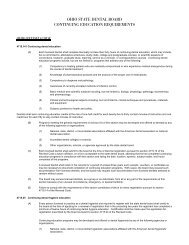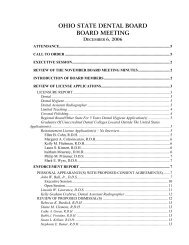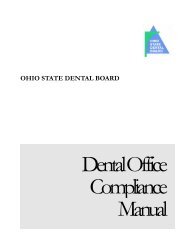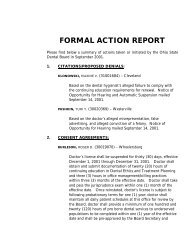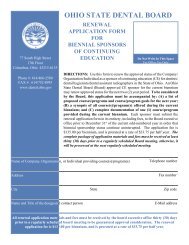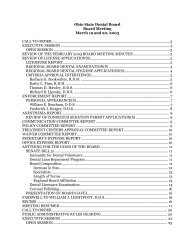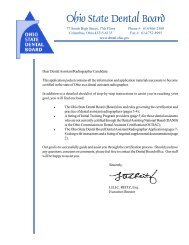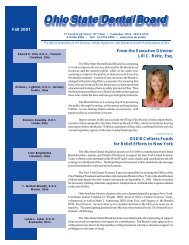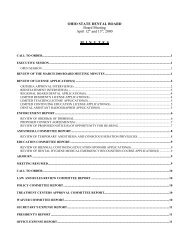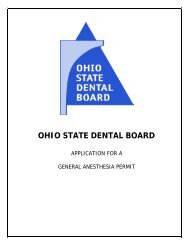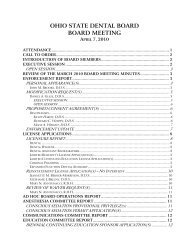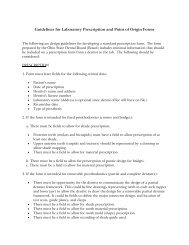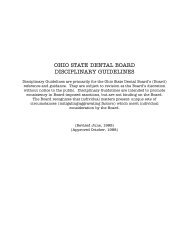OHIO STATE DENTAL BOARD BOARD MEETING - the Ohio State ...
OHIO STATE DENTAL BOARD BOARD MEETING - the Ohio State ...
OHIO STATE DENTAL BOARD BOARD MEETING - the Ohio State ...
Create successful ePaper yourself
Turn your PDF publications into a flip-book with our unique Google optimized e-Paper software.
<strong>OHIO</strong> <strong>STATE</strong> <strong>DENTAL</strong> <strong>BOARD</strong><br />
<strong>BOARD</strong> <strong>MEETING</strong> MINUTES<br />
OCTOBER 14, 2009 PAGE 30<br />
commented that <strong>the</strong> Bar Association is currently investigating into this exact issue for all<br />
regulatory Boards. That being said, Dr. Leffler commented that we should include in our<br />
testimony that this is something that should be addressed by <strong>the</strong> <strong>Ohio</strong> Supreme Court<br />
and <strong>the</strong> Bar Association.<br />
Dr. Armstrong recognized David Owsiany, Executive Director of <strong>the</strong> <strong>Ohio</strong> Dental<br />
Association. Mr. Owsiany stated that he wanted to make a general observation that may<br />
not be well received by <strong>the</strong> Board members. He stated that <strong>the</strong>re is tenure in <strong>the</strong><br />
General Assembly that <strong>the</strong> members should be made aware of regarding <strong>the</strong> <strong>Ohio</strong> <strong>State</strong><br />
Dental Board. He stated that just going to <strong>the</strong> General Assembly and telling <strong>the</strong>m to<br />
trust <strong>the</strong> Dental Board to put <strong>the</strong> language in question into rule and to take it out of<br />
statute would not be received well. He recommended that if <strong>the</strong>re is language in <strong>the</strong> Bill<br />
that <strong>the</strong> Board cannot really live with, it would be received better if <strong>the</strong>re is proposed<br />
alternate language for <strong>the</strong> General Assembly to consider. Mr. Owsiany explained that<br />
this Bill has passed one house of <strong>the</strong> General Assembly and it is highly unlikely that <strong>the</strong>y<br />
are going to gut <strong>the</strong> Bill at this point and say that <strong>the</strong> o<strong>the</strong>r House is going to concur.<br />
He urged <strong>the</strong> Board to consider making specific alternate language and <strong>the</strong> legislators<br />
may <strong>the</strong>n consider many of <strong>the</strong> Board’s recommendations as to how to improve <strong>the</strong> Bill<br />
over just telling <strong>the</strong> General Assembly that <strong>the</strong> Board will pursue regulation via rule.<br />
SUBPOENAS<br />
Dr. Kaye commented that <strong>the</strong>re were two (2) issues regarding subpoenas. He stated<br />
that <strong>the</strong> first one was checking off <strong>the</strong> subpoena with <strong>the</strong> Assistant Attorney General.<br />
Mr. Yonadi explained <strong>the</strong> current process requires that ei<strong>the</strong>r <strong>the</strong> Board Secretary or <strong>the</strong><br />
Board Vice-Secretary are required to sign off on any investigative subpoenas. Ms.<br />
Bockbrader stated that currently most if not all of <strong>the</strong> o<strong>the</strong>r regulatory boards are<br />
required to request <strong>the</strong>ir investigative subpoenas through <strong>the</strong> Attorney General’s office.<br />
She stated that obtaining <strong>the</strong> subpoenas this way is not an issue.<br />
Dr. Kaye continued on by stating that <strong>the</strong> second issue regarding subpoenas was in<br />
<strong>the</strong> process. He stated that <strong>the</strong> current statute states that <strong>the</strong> Board requests <strong>the</strong><br />
subpoena and new legislation stipulates that <strong>the</strong> Board Secretary or Vice-Secretary must<br />
request <strong>the</strong> subpoena. He suggested that this be recommended to be regulated by rule.<br />
Discussion followed wherein <strong>the</strong> decision of <strong>the</strong> Board was to follow <strong>the</strong> testimony<br />
provided previously by Dr. Armstrong.<br />
STATUTE OF LIMITATIONS<br />
Dr. Armstrong moved on to <strong>the</strong> language regarding <strong>the</strong> statute of limitations for<br />
investigation purposes. He stated that this issue clearly outlined <strong>the</strong> differing opinions<br />
of <strong>the</strong> Board members. Dr. Kyger stated that it was her understanding that some of <strong>the</strong>



